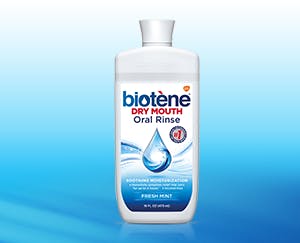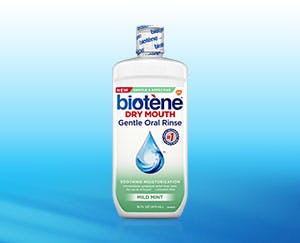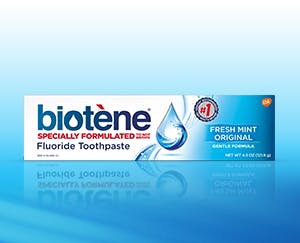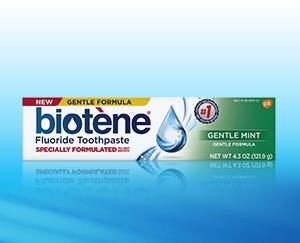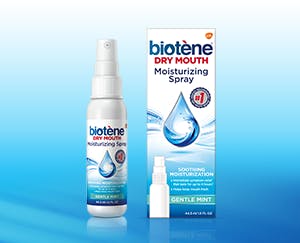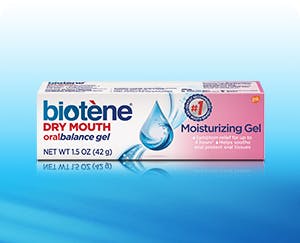Dry mouth can lead to a sticky feeling in your mouth. This is due to your body’s inability to create enough saliva, which can cause a number of issues like dry lips, bad breath, or a rough tongue.1
Saliva plays such an important role in oral health. It helps to wash away food debris when you eat and helps prevent tooth decay, keeping them healthy in the long run.1 If you feel compelled to brush your teeth more often to help keep your teeth clean, be aware that certain toothpastes can enhance the dry mouth sensation.2 Learn why this happens and how to manage it.

What is Sodium Lauryl Sulfate?
A common ingredient in toothpaste is sodium lauryl sulfate, or SLS. Besides toothpaste, it regularly appears in beauty products, washes, and household cleaning products.3 SLS is a surfactant, used to bind the ingredients of a cleaning product together so that it can effectively scrub away plaque.3 It’s also responsible for the foaming effect that most toothpastes have, which has the effect of removing food debris from your teeth.3 SLS also appears in dish soap and shampoo and produces same foaming effect that people tend to associate with an effective cleanser.3 Sodium lauryl sulfate can irritate dry mouth symptoms and make the symptoms even worse.2
Look at the ingredient list of the toothpaste you’ve been using to brush your teeth. If sodium lauryl sulfate is listed, you may want to consider stopping use of that product.4 In addition to being irritating to people with dry mouth, SLS may also contribute to the formation of canker sores.4
Caring for Your Teeth with Dry Mouth
If you’ve experienced dry mouth after brushing your teeth, you may need to change up some of your oral care habits. Before you try a new toothpaste, take a look at the ingredients and make sure that SLS isn’t listed among them. It is best to contact your dental professional for toothpaste suggestions that would work best for you.
Instead, look for a toothpaste that’s specially formulated to not irritate your mouth like Biotene Fresh Mint Original Fluoride Toothpaste. One of its ingredients is fluoride, which can help prevent gum disease and cavities that dry mouth can cause.5
People with dry mouth should understand the condition’s effect on oral health and should take steps to care for their teeth. Make sure you’re brushing twice a day and flossing regularly.4 Use a soft bristled toothbrush and opt for a low-abrasive toothpaste that isn’t labeled “whitening” or “tartar control”.4
Another option for oral care is using a mouthwash that’s specially formulated not to irritate dry mouth. Biotene Dry Mouth Oral Rinse can help freshen your breath and relieve symptoms, which can help increase saliva production.4 This rinse is soothing, gentle and helps clean and refresh the mouth while relieving dryness associated with dry mouth symptoms for up to 4 hours, as measured in a 28-day clinical study.
Don’t despair if your regular toothpaste is exacerbating your dry mouth symptoms! There are products that can clean your teeth and make you feel more comfortable.
Source Citations:
- Managing dry mouth. The Journal of the American Dental Association. https://jada.ada.org/article/S0002-8177(14)00056-7/fulltext.Accessed 9/8/23.
- Dry mouth. Oral Health Foundation. https://www.dentalhealth.org/dry-mouth.Accessed 9/8/23.
- What is sodium lauryl sulfate and is it safe to use? The University of Queensland Australia. https://medicine.uq.edu.au/article/2019/12/what-sodium-lauryl-sulfate-and-it-safe-use.Accessed 6/7/23.
- Management of Dry Mouth. Johns Hopkins Sjogrens Center.https://www.hopkinssjogrens.org/disease-information/treatment/management-of-dry-mouth/.Accessed 6/7/23.
- Fluoride: Uses, Benefits & Side Effects. https://my.clevelandclinic.org/health/drugs/11195-fluoride.Accessed 9/8/23.



